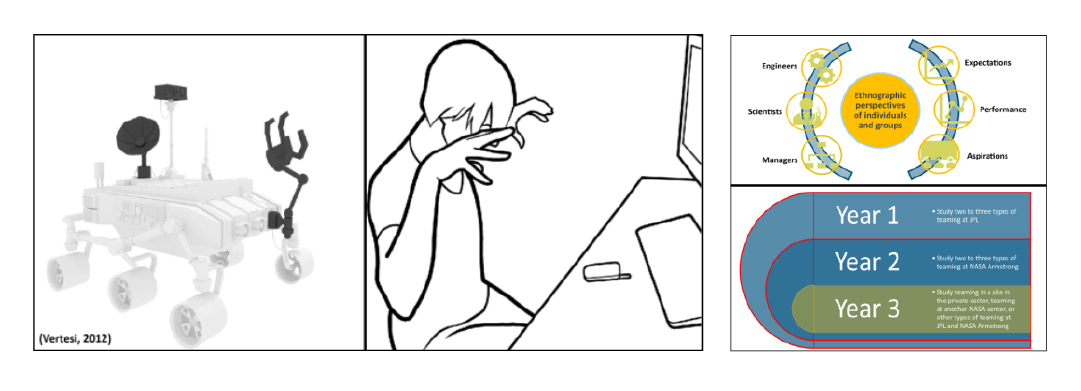Team Culture and Communication among Scientists, Engineers, and Managers as NASA’S JPL
Phase One: Fostering the Science and Technology Laboratory of the Future
Phase Two: Laboratory of the Future in the Post-COVID Context
Abstract
Phase Two:
Based on B. PROJECT WORK PLAN: Team II will continue to explore the dynamics of team work at JPL with an eye toward recommendations for enhancing the efficiency and qualities of effective teams, and transitions occurring in the Post-COVID context. The study asks what kinds of technological responses are necessary in order for teams to effectively adapt to the post-COVID context? What kinds of social responses are necessary for successful adaptations? We plan to explore these questions using ethnographic research methods adapted for digital contexts. We plan to observe teamwork and communication in virtual meetings, conduct follow-up interviews, and a survey. We plan to contribute feedback and recommendations for adaptations to teamwork in a white paper. The implications for this research relate to improving the efficiency and qualities of teams and teamwork including improved communications among team members and managers.
Motivation/Research Problem
Phase One:
Teams form the basis for work in NASA; however, how teams are structured, operate, solve problems, and communicate is rarely examined from an ethnographic perspective. Many have studied leadership in relationship to teaming, focusing on the characteristics of leaders and styles of enacting leadership. Less has been said, however, about other dimensions of teaming such as the formation, socialization, and maintenance of teams, and the creation of norms, identities, and practices that are internal to team dynamics and the broader workplace, and which shape team productivity.
Phase Two:
Based on JPL’s 2018 strategic plan, the center aims to become the “laboratory of the future.” This study will contribute insights that will help JPL to meet this goal. This project proposes an especially innovative approach to examining teaming. The ethnographic perspective, provides an “on-the-ground” (in cyberspace) look at teams and workplace culture and their internal cultural dynamics. This perspective combined with what is already known about styles of leadership, will contribute to offering suggestions that will shape the productivity of JPL work teams.
Lead Researchers:
- Suzanne Scheld, Anthropology
- Nhut Ho, Mechanical Engineering
Collaborators:
- John Day, Manager, Engineering Development Office, Systems Engineering Division, NASA, JPL
- Ann Devereaux, Deputy Manager of Systems Engineering Division (Division 31), JPL Center for Autonomy
Student Team:
- Neil Thompsett
- Michael Baumgartner
- Susan Hann Doyle
- Susan Hann Doyle
- Daniella Contreras
- Mychaela Langlois,
- Gavin Saint Cry
- Ann Margaret Price
- Liz Knight
Funding
- Funding Organization: NASA
- Funding Program: MIRO

Alignment, Engagement and Contributions to the priorities of NASA’s Mission Directorates
Phase One and Two:
Based on JPL’s 2018 strategic plan, the center aims to become the “laboratory of the future.” This study will contribute insights that will help JPL to meet this goal. This project proposes an especially innovative approach to examining teaming. The ethnographic perspective, provides an “on-the-ground” (in cyberspace) look at teams and workplace culture and their internal cultural dynamics. This perspective combined with what is already known about styles of leadership, will contribute to offering suggestions that will shape the productivity of JPL work teams.
Research Questions and Research Objectives
Phase One:
- How do team members with diverse backgrounds, training, experience, and in different positions on work teams perceive and enact their roles and communication with others?
In order for JPL to become the laboratory of the future, how would team members with diverse backgrounds, training, experience, and in different positions on work teams like for team members to perform their roles and communicate with others?
Phase Two:
- How do team members with diverse backgrounds, training, experience, and in different positions on work teams perceive and enact their roles and communication with others?
- How has communication been impacted by COVID-19?
- How does communication need to adjust in response to COVID-19 and the all for JPL to become the laboratory of the future?
Research Methods
Phase One:
There are three stages to the research and four methods that will be employed.
- Stage 1: “Developing a Baseline Picture of Teaming”. During this stage, the research team will document information about the nature of teams at JPL through archival research. We will also conduct key informant interviews with select managers, facilitators of team development at JPL’s “A-Team/X-Team” (the center’s project incubator), and the leaders of JPL’s junior engineer support group in order to develop insights for structuring team observations.
- Stage 2: “Observing Teams at Work”. During this stage, we will conduct semi-structured observations of work teams (e.g., Clipper, Psyche or other work teams) as they interact in teleconferenced review meetings. The team will focus on patterns in discourse and the flow of conversation.
- Stage 3: “Team Members’ Perceptions of Teaming”. During this stage, the research team will undertake semi-structured interviews with team managers, lead engineers, and the variety of other engineers (e.g., systems, flight, and payload engineers) who comprise the work teams. We will seek to interview approximately eleven (11) members in each team (e.g. one manager, one lead engineer, three payload engineers, three flight engineers, and three systems engineers). The goal of these interviews is to understand team members’ perceptions and experiences of teaming at JPL.
Phase Two:
- Stage 1: Reanalyze Team I’s data and develop recommendations based on Team I’s research
- Stage 2: Develop interview and survey instruments to analyze new questions related team work in the Post-COVID 19 context.
- Stage 3: Analyze new outcomes
Research Deliverables and Products
Phase One:
Anticipated deliverables
- Ethnographic portraits highlighting the features of teaming and an “organizational chart” of teams from a “folk” perspective
- A list of suggested metrics for assessing effective team communication and productivity
- A master’s thesis about teaming at JPL
- A literature review on relevant social science and anthropological literature on teaming and NASA
- An applied publication on teaming
Anticipated Publications
We anticipate submitting a publication about our research to Human Organization or another applied journal in anthropology. We will also consider submitting manuscripts to other journals that address managing human resources for STEM-related industries.
Conference Presentations
We had three abstracts accepted by the Southwestern Anthropological Association (SWAA) annual conference. Due to COVD-19, however, this conference was cancelled. Neil Thompsett presented our research proposal at CSUN’s Department of Anthropology’s Annual “Anthro Expo” conference on April 20, 2020, and at CSUN’s Department of Anthropology’s Annual Graduate Student Colloquium on May 11, 2020.
Phase Two:
- A literature review on relevant social science and anthropological literature on teaming and NASA
- An applied publication on teaming
Anticipated Publications
We anticipate submitting a publication about our research to Human Organization or another applied journal in anthropology. We will also consider submitting manuscripts to other journals that address managing human resources for STEM-related industries.
Conference Presentations
We submitted a paper to the ASCEND conference, however, our submission was rejected. We will aim to submit a presentation for the Applied Anthropology meetings.
Research Timeline
Phase One:
Start Date: October 2019
End Date: February 2022
Phase Two:
Start Date: December 2020
End Date: January 2022
Lead Researchers:
- Suzanne Scheld, Anthropology
- Nhut Ho, Mechanical Engineering
Collaborators:
- John Day, Manager, Engineering Development Office, Systems Engineering Division, NASA, JPL
- Ann Devereaux, Deputy Manager of Systems Engineering Division (Division 31), JPL Center for Autonomy
Student Team:
- Giselle Barrera
- Michael Baumgartner
- Daniella Contreras
- Susan Hann Doyle
- Liz Knight
- Mychaela Langlois,
- Ann Margaret Price
- Gavin Saint Cry
- Neil Thompsett
Funding
- Funding Organization: NASA
- Funding Program: MIRO
